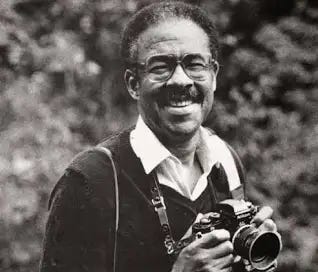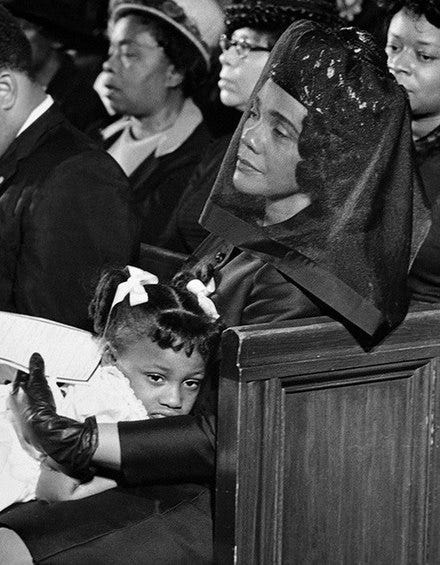Today In Black History: Moneta Sleet
Pulitzer Prize-winning Black photographer
Issue #627 Today In Black History, Wednesday, June 5, 2024
Please share and subscribe to help us grow this publication.
If you like us, REALLY like us, please click the “Like” button at the end of this post!
Also, please scroll to the end of this post for other ways to financially support us and We Are Speaking with our books and courses.
We appreciate your support!
Today’s Black History WOW!
Photo Credit: Owensboro Parks and Recreation
Moneta Sleet, born on February 14, 1926, was a Pulitzer Prize-winning African American photojournalist known for his impactful images that documented the Civil Rights Movement and the struggles of the Black community in America in the 2nd half of the 20th century.
Sleet was born on February 14, 1926, in Owensboro, Kentucky. He graduated cum laude from HBCU Kentucky State College (now Kentucky State University) in 1947 and went on to obtain a master's degree in journalism from New York University (NYU) in 1950. He also studied at the School of Modern Photography where he furthered his photography skills.
Sleet also served in an all-African American unit in World War II and was an assistant at a commercial-operated studio. After his education at NYU, he was a sports journalist for the Black-owned and operated Amsterdam News in New York and John P. Davis' magazine Our World.
Sleet began working for Ebony magazine in 1955. Over the next 41 years, he captured photos of almost all of the famous and not-so-famous Black leaders and celebrities in the United States and globally. When Coretta Scott King found out that no African American photographers had been assigned to cover her husband's funeral service, she demanded that Sleet be a part of the press pool. If he was not, she threatened to bar all photographers from the service.
During Sleet's 41 years at Ebony, he also worked by Martin Luther King Jr.’s side for 13 years, capturing historical moments of the civil rights movement. A famous image of Rosa Parks, MLK, Ralph Abernathy, Ralph Bunche, and Coretta Scott King leading marchers was captured by Moneta. He also captured images of the Montgomery bus boycott, MLK's I Have a Dream speech at the Lincoln Memorial, and the march from Selma to Montgomery.
One of Sleet's most iconic photographs was taken on April 9, 1968, capturing the grief-stricken face of Coretta Scott King at the funeral of her husband, Dr. Martin Luther King Jr. This poignant image earned Sleet the prestigious Pulitzer Prize for Feature Photography in 1969, making him the first African American to receive this honor and the first African American to win the award for journalism.
Photo Credit: Moneta Sleet for Ebony Magazine
Besides his photo of Coretta Scott King, Sleet also captured grieving widow Betty Shabazz at the funeral of her husband Malcolm X. A collection of his photographs in book form, Special Moments in African-American History, 1955-1996: the Photographs of Moneta Sleet, Jr., Ebony Magazine's Pulitzer Prize Winner, was published posthumously in 1998.
Throughout his career, Sleet continued to document the struggles and triumphs of African Americans, from the Civil Rights Movement to the everyday moments of joy and resilience within the community. His images served as a powerful reminder of the importance of representation and the need to amplify the voices of marginalized individuals.
Moneta Sleet died of cancer at Columbia-Presbyterian Medical Center on September 30, 1996.
Today In Black History
In 1783, Oliver Cromwell, a Black soldier in the Revolutionary War, received an honorable discharge and the Badge of Merit from George Washington.
In 1851, the anti-slavery novel, “Uncle Tom’s Cabin,” was published in serial form by author Harriet Beecher Stowe.
In 1872, the Republican National Convention met in Philadelphia with substantial Black representation from the Southern States. For the first time in American history, three Black people addressed a major national political convention.
In 1894, Black inventor G.W. Murray received patents for a fertilizer distributor and a cotton chopper.
In 1940, the American Negro Theater was organized by Frederick O’Neal and Abram Hill.
In 1955, Rev. Martin Luther King was awarded his doctorate from Boston University.
In 1956, a federal court ruled that racial segregation on the city buses of Montgomery, Alabama, violated the U.S. Constitution.
In 1987, Dr. Mae Jamison became the first Black female astronaut.
Our paid subscribers are encouraged to discuss this post in our W.A.S. Chat Community.
Join Pamela Hilliard Owens’s subscriber chat
Available in the Substack app and on web
You are also welcome to view “We Are Speaking” in Substack Notes. You can also read other Substack publications without subscribing to them when you join Notes.
This post is free to read for three days. To have access 365/24/7 to our full archive, comment on our posts, and financially support “We Are Speaking” for no more than $5 per month, please subscribe at the paid level.








